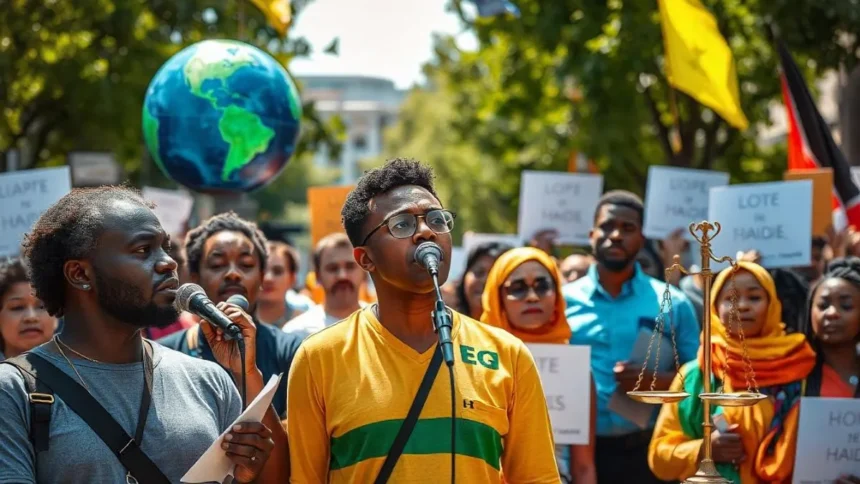Freedom of expression is a cornerstone of modern societies, representing the right to voice opinions, share ideas, and participate in public discourse without fear of censorship or retribution. As a fundamental human right, it fosters individual empowerment and collective progress. However, with increasing complexities brought by globalization, technology, and political dynamics, its role in society has come under scrutiny.
This article explores the multifaceted role of freedom of expression, emphasizing its significance, challenges, and the delicate balance required to preserve this essential liberty while ensuring responsible usage.
What Is Freedom of Expression?
Historical Context
Freedom of expression has deep historical roots, tracing back to ancient civilizations like Greece and Rome, where public debates were encouraged. The Enlightenment era brought significant advancements, with thinkers like John Locke and Voltaire championing the right to free speech as a foundation of liberty and progress.
Legal and Ethical Framework
Modern interpretations of freedom of expression are enshrined in key documents such as the Universal Declaration of Human Rights (Article 19) and various national constitutions. These frameworks emphasize the right to express opinions freely, access information, and engage in open dialogue, balanced by ethical considerations to prevent harm.
The Importance of Freedom of Expression
Empowering Individuals
Freedom of expression allows individuals to share ideas, challenge norms, and advocate for change. It provides a platform for marginalized voices, fostering equality and inclusivity.
Supporting Democratic Values
In democratic societies, freedom of expression is vital for informed decision-making. It ensures transparency, holds power accountable, and enables citizens to engage actively in governance.
Fostering Creativity and Innovation
The free flow of ideas fuels creativity and innovation, driving advancements in arts, sciences, and technology. It allows diverse perspectives to flourish, enriching cultural and intellectual landscapes.
Freedom of Expression in the Digital Age
Social Media Platforms
The internet, particularly social media, has revolutionized freedom of expression by democratizing content creation. Individuals now have unprecedented access to platforms where they can reach global audiences.
The Rise of Citizen Journalism
With smartphones and social media, citizen journalism has emerged as a powerful tool, providing real-time updates and diverse viewpoints often absent in mainstream media.
Challenges of Misinformation
While digital platforms amplify voices, they also pose significant challenges, such as the spread of misinformation, fake news, and the manipulation of public opinion. These issues highlight the need for critical thinking and robust fact-checking mechanisms.
Challenges to Freedom of Expression
Government Censorship
In many parts of the world, governments impose restrictions on freedom of expression to suppress dissent and control narratives. Censorship, whether overt or subtle, undermines democracy and stifles progress.
Hate Speech and Online Harassment
The rise of hate speech and online harassment has sparked debates about the boundaries of free expression. While open dialogue is essential, harmful content can perpetuate discrimination and violence, necessitating regulations to maintain a safe space for discourse.
Cultural and Social Constraints
Cultural norms and social stigmas often limit freedom of expression, particularly for women, minorities, and LGBTQ+ communities. These constraints highlight the need for continued advocacy and societal change.
Balancing Freedom and Responsibility
Ethical Boundaries
Freedom of expression comes with responsibilities. Ethical boundaries ensure that this right does not infringe upon others’ dignity, safety, or freedoms. Promoting respectful dialogue is key to maintaining societal harmony.
Regulations and Oversight
Regulatory frameworks can help balance free expression and accountability. Transparent oversight mechanisms, developed in collaboration with stakeholders, are essential for addressing misuse without stifling legitimate speech.
The Role of Education
Education plays a pivotal role in fostering responsible expression. By teaching critical thinking, media literacy, and empathy, societies can cultivate informed citizens capable of engaging constructively.
Case Studies: Freedom of Expression Around the World
- United States: Protected under the First Amendment, freedom of expression in the U.S. has facilitated robust public discourse but faces challenges with misinformation and hate speech.
- China: Stringent censorship policies limit free expression, particularly online, reflecting the tension between state control and individual liberties.
- Scandinavia: Countries like Norway and Sweden consistently rank high in freedom of expression indices, demonstrating the benefits of open dialogue and press freedom.
- Middle East: Activists in countries like Iran and Saudi Arabia face significant risks when advocating for free speech, underscoring the ongoing struggle for this fundamental right.
Freedom of expression is indispensable to modern society, underpinning democracy, innovation, and individual empowerment. However, it requires careful stewardship to address challenges like censorship, hate speech, and misinformation. By promoting ethical boundaries, robust regulations, and education, societies can safeguard this right for future generations.
As technology continues to reshape communication, the need to protect and responsibly exercise freedom of expression has never been more critical.







